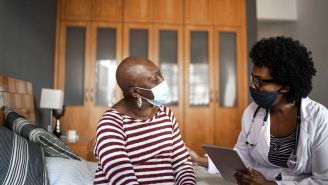Updated on May 31, 2023.
The next time you cook dinner, you may want to skip the steak and opt for fresh fish or skinless chicken breast. Why? Research suggests that women who eat a lot of red or processed meats have a higher risk for breast cancer.
One large 2020 review published in the International Journal of Environmental Research and Public Health linked the two, for example. It also found that diets with little red or processed meat—such as the Mediterranean diet—may be associated with a smaller chance of developing the disease.
Why the link?
While an exact explanation for the connection isn’t clear, researchers have a few guesses.
One possibility is that red meat that's been cooked at high temperatures has been shown to release potentially cancer-causing byproducts. Using high-heat cooking methods—such as grilling—causes fat to drip onto coals, which generates dangerous compounds called polycyclic aromatic hydrocarbons (PAHs). These can end up on your burger or steak, and when eaten, PAHs may harm cells.
Another theory is that hormones given to cattle to increase their growth may also raise certain hormone levels within humans, which could increase risk. Processed meats contain nitrates and nitrites, too, which have been associated with greater odds of breast cancer. Some research suggests that the higher saturated fat of meat compared to other lean proteins may play a role. It could also be that people who eat less red or processed meat tend to have other healthy habits that help lower the chances of breast cancer.
One 2019 study published in the International Journal of Cancer supported some of these theories. Though researchers found no links between breast cancer risk and cooking method, disease risk was tied to compounds in red meat that may contribute to increased tumor formation. Further supporting this idea: Substituting poultry for red meat was associated with decreased risk.
Limiting your red meat intake
Breast cancer isn’t the only issue associated with red and processed meat consumption. There’s compelling evidence that meat-heavy diets raise a person’s risk for additional health problems like heart disease, Alzheimer’s disease, stroke, type 2 diabetes, and colorectal cancer.
To lower your risk of these conditions, it’s a smart idea to limit your red meat consumption, especially of items that are high in saturated fat or processed. Instead, focus on other protein sources, like fish, beans, or poultry.
With that in mind, here are some simple, realistic, and achievable tips to help you cut down on red meat:
Trade hamburgers for alternative meat-based patties. Veggie burgers, marinated Portobello mushroom caps, and turkey or chicken burgers can be a heart-healthy substitutes for red meat patties.
Try adding more beans. Your favorite soups, stews, and casseroles can still taste great with a little less beef and a few more beans. Beans are an excellent meat substitute because they are high in protein, filled with fiber, and low in fat.
Assess your day for easy areas to adjust. For example, if you find that you’re eating red meat for breakfast, lunch, and dinner, try eliminated it from one of those meals. If you’re having a breakfast sausage in the morning, try a veggie or turkey-based sausage. If you’re having a roast beef sandwich for lunch, try a turkey, tuna, or egg salad sandwich. And if you’re making beef stir fries for dinner, try subbing in tofu or chicken.
Watch portion sizes. Experts recommend that healthy adults eat about 26 ounces of eggs, poultry, or meat each week, which works out to about 3 or 4 ounces per day. One 3- or 4-ounce serving of red meat cooks down to about the size of a deck of cards or the palm of your hand.







